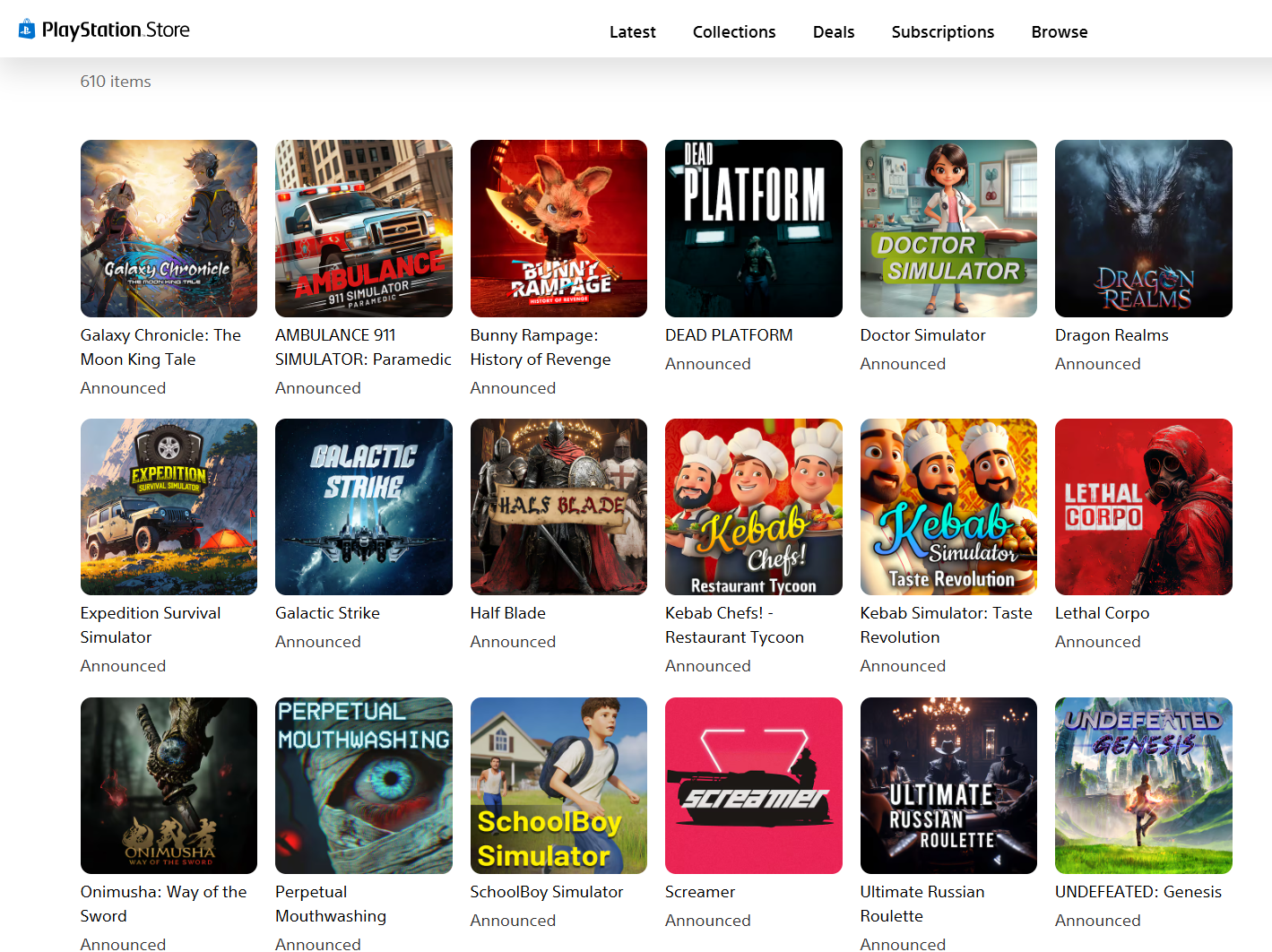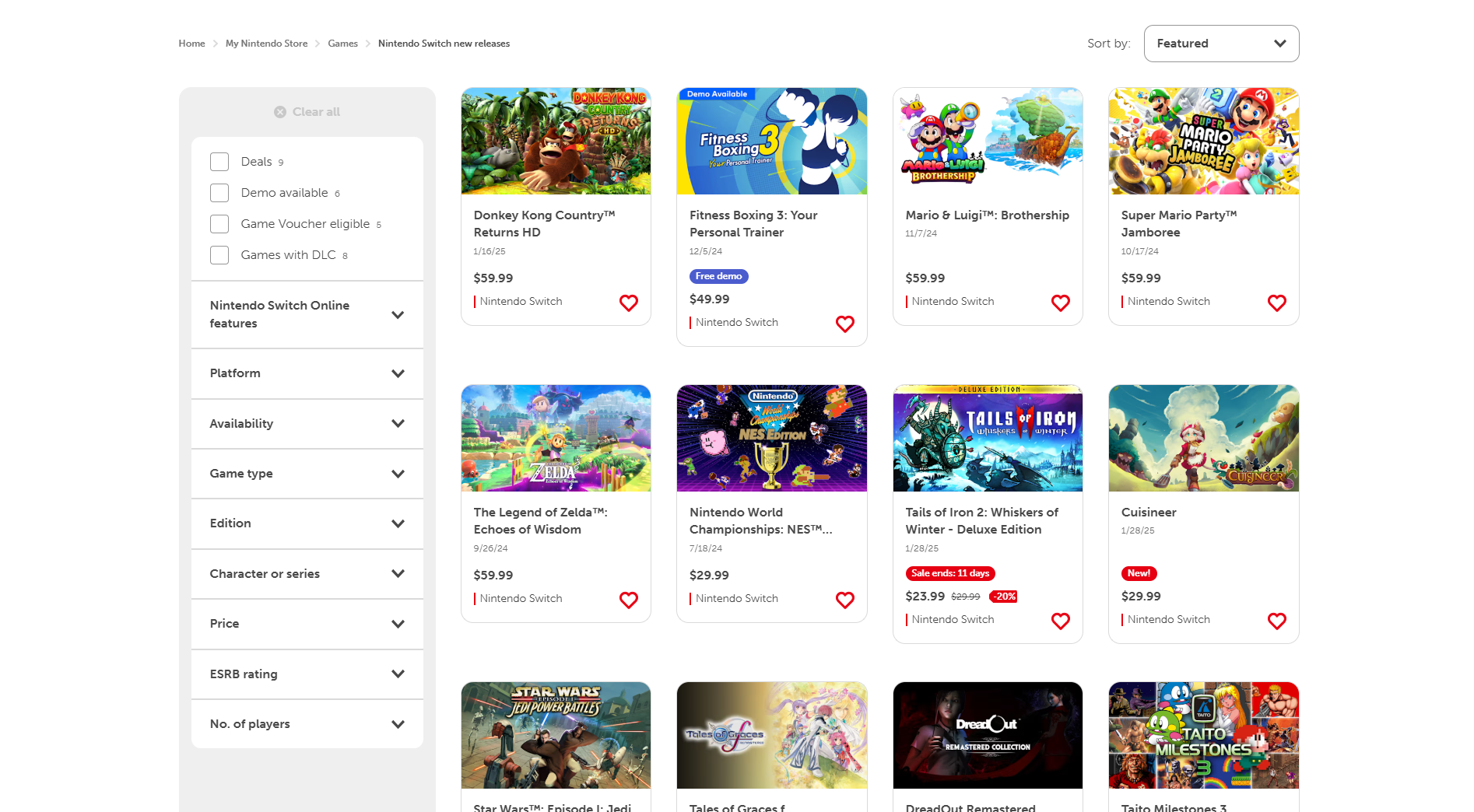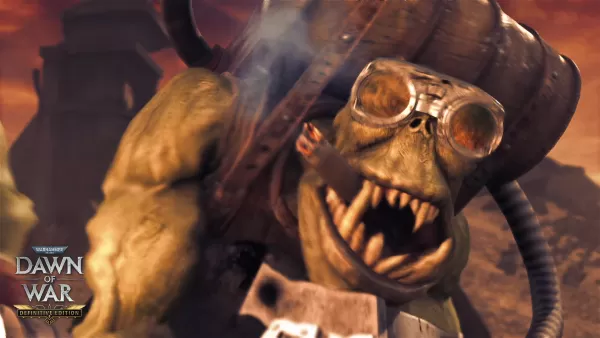by George Apr 12,2025
There's a growing issue on the PlayStation Store and Nintendo eShop that's catching the attention of gamers and industry insiders alike. Over the past few months, these platforms have been inundated with what users are calling "slop" – a term used to describe a flood of low-quality, misleading games that often use generative AI to create their store pages. Publications like Kotaku and Aftermath have shed light on this concerning trend, noting how it's particularly rampant on the Nintendo eShop, with similar issues now spreading to the PlayStation Store, especially in sections like "Games to Wishlist."
These "slop" games aren't merely bad; they're a different breed altogether. They tend to be simulation games, perpetually on sale, and often mimic themes or outright copy the concepts and names of more popular titles. Their store pages are frequently adorned with hyper-stylized art and screenshots that suggest the use of generative AI, but the actual gameplay rarely matches these promises. These games are often buggy, with poor controls and minimal features, disappointing players who fall for their misleading marketing.
A small group of companies is behind this relentless churn of games, making it difficult for consumers to hold them accountable. As noted by YouTube creator Dead Domain, these companies are elusive, often changing names and lacking transparent business information. The frustration among users is palpable, with many calling for better regulation on these storefronts, especially as Nintendo's eShop struggles with slow performance exacerbated by the influx of these games.
To understand why this is happening, I spoke with eight individuals in game development and publishing, all of whom requested anonymity. Their insights revealed the process of getting a game onto major storefronts like Steam, Xbox, PlayStation, and Nintendo Switch. The journey typically begins with a pitch to gain access to development portals and devkits, followed by filling out forms about the game's details. The next step is "cert" or certification, where the game is checked against specific technical requirements to ensure it meets platform standards and complies with legal and rating guidelines.
A common misconception is that certification acts as a quality assurance check, but as one publisher explained, "This is incorrect; that's the responsibility of the developer/publisher prior to submission. The platforms check to make sure the game's code complies with hardware specifications." If a game fails certification, it's sent back for fixes, but developers often receive only error codes without detailed feedback, especially from Nintendo.
Store pages are another critical aspect, with platform holders requiring developers to use accurate screenshots. However, there's no rigorous process to verify this accuracy, and checks are mainly to ensure no competing imagery or incorrect language is used. One developer recounted an instance where Nintendo caught a screenshot mismatch, but such incidents are rare. Nintendo and Xbox review all store page changes, while PlayStation does a single check near launch, and Valve reviews pages before they go live but not afterward.
The punishment for misleading screenshots is typically lenient, often just a request to remove the content. There are no rules against using generative AI on console storefronts, though Steam requires disclosure of its use. This lack of regulation contributes to the proliferation of "slop" games.
The reasons behind the flood of "slop" on Nintendo and PlayStation are multifaceted. Unlike Microsoft, which vets games on a case-by-case basis, Nintendo, Sony, and Valve approve developers once, allowing them to release multiple games easily if they pass certification. This system is exploited by some to flood the stores with low-quality games. Nintendo, in particular, is seen as vulnerable to such practices, with one developer noting, "Nintendo is probably the easiest to scam."
Some developers use tactics like releasing bundles and setting them on perpetual discount to stay at the top of sales and new releases pages, overshadowing other, more carefully crafted games. PlayStation's "Games to Wishlist" section, sorted by release date, further exacerbates the issue by highlighting unreleased games with vague release windows.
While generative AI is often blamed, the core problem is more about discoverability and the ease with which low-effort games can flood the market. Xbox mitigates this somewhat with curated store pages, but it's not immune. Steam, despite having the most potential "slop," benefits from robust sorting and search options and a constantly refreshing new releases section, which dilutes the impact of such games.
Users are increasingly calling for Nintendo and Sony to address these issues, but the response has been limited. Developers and publishers are skeptical about quick fixes, with some suggesting that Nintendo's upcoming Switch 2 might only see marginal improvements. Sony has taken action in the past against "spam" content, indicating a potential for future intervention.
However, aggressive platform regulation is not universally supported. An initiative by Nintendo Life called "Better eshop" aimed to filter out "slop" but faced backlash for incorrectly categorizing games. This highlights the risk of overzealous filtering harming legitimate indie games.
Developers fear that stringent quality control might inadvertently target quality software, as one publisher noted, "Personally, I fear that game platforms might accidentally target quality software." There's also sympathy for the platform holders, who must navigate the challenging task of distinguishing between various types of games without overstepping their role as mere facilitators of game distribution.


Mobile Legends: January 2025 Redeem Codes Released
Android Action-Defense
Pokemon TCG Pocket: Paralyzed, Explained (& All Cards with ‘Paralyze’ Ability)
Brutal Hack And Slash Platformer Blasphemous Is Coming To Mobile, Pre-Registration Now Live
Pokémon TCG Pocket Is Dropping a Trade Feature and Space-Time Smackdown Expansion Soon
Mythical Island Debuts in Pokemon TCG, Time Revealed
GWENT: Top 5 Decks for 2025 - Strategies Revealed
Marvel Rivals Showcases New Midtown Map

Palworld's Early Access Is Legitimate, Bucky Asserts
Dec 16,2025

Sony WH-1000XM5 Headphones Hit Record Low for Labor Day
Dec 16,2025

PlayStation Days of Play 2025 Sale Starts
Dec 14,2025

Warhammer 40,000: Dawn of War's Definitive Edition Out Now
Dec 13,2025

Martin's Hercules Animation Stalls Winds of Winter
Dec 13,2025